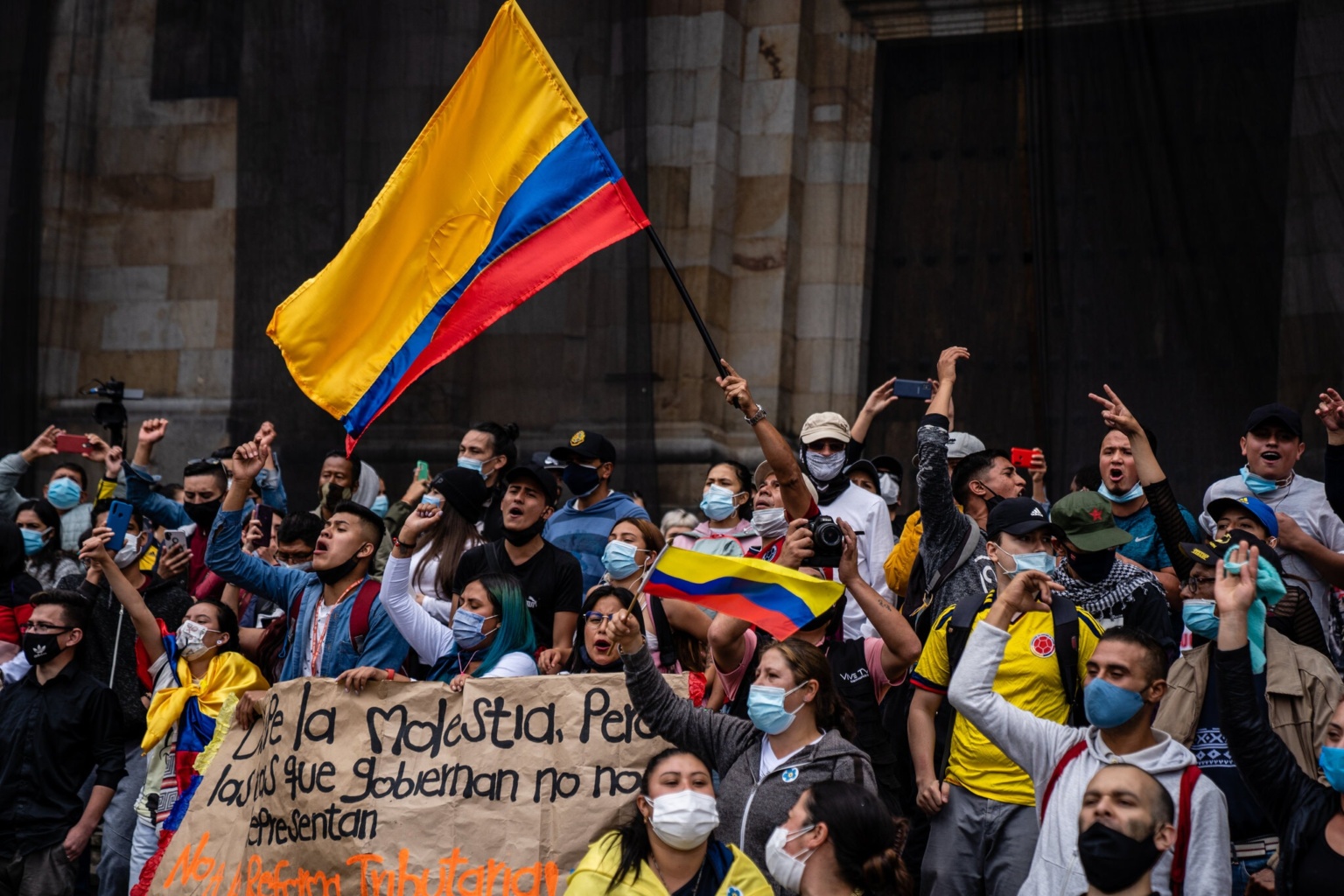RIO DE JANEIRO, BRAZIL – Protests against the Colombian government returned to the streets this Tuesday, July 20, on the occasion of Independence Day and the installation of the National Congress, to which the ruling party and the opposition presented bills related to the social demands that drove the mobilizations.
The day of demonstrations was festive in the main cities of the country where thousands of people raised their demands for justice, employment, health, and education, as well as demanded the State to respect life and human rights.
Read also: Check out our coverage on Colombia
However, there were disturbances in Medellin and Manizales, where demonstrators clashed with the police.
“Let the excessive police violence against demonstrators and in particular against young people stop,” said the president of the Central Unitaria de Trabajadores (CUT), Francisco Maltés, at the start of a concert in Bogotá by the rock band Aterciopelados.

Colombian president, Iván Duque, responded in advance to these claims during the speech with which he opened the new congressional session, in which he acknowledged that the country has a “historical debt” with the poorest.
“We know and understand that there are historical debts to settle, that there are many frustrations that we feel as a society, but we will find the solution by working as a team”, said Duque before the full Congress, which this year, due to the protests called, was installed at 9 AM and not at 3 PM as is traditional.
Duque also paid tribute on Independence Day to the Military and Police Forces, to the families of all the victims of the pandemic and the country’s violence, and called on Colombians to “find solutions that will make us greater as a society”.
REJECTION OF POLICE VIOLENCE
Since April 28, Duque has been facing a social crisis unprecedented in the recent history of the country, which erupted due to the rejection of a large part of the society, mainly the young population, to his government’s fiscal policy.
Those massive mobilizations in May and June were generally peaceful, but in cities such as Cali and Bogotá they were marked by violence.
The Colombian Attorney General’s Office has documented more than twenty deaths in the 50 days of protests, but several human rights organizations put the figure at 84, at least 20 by police gunfire, as they told the mission of the Inter-American Commission on Human Rights (IACHR) that visited the country in June.
For this reason, the President presented this Tuesday before the Congress the Project of Integral Transformation of the National Police, which promotes a spirit of proximity to citizens, transparency in the procedures of the institution and strengthening the protection of human rights.
He also initiated the legislative process of a bill for a new career statute for the professionalization of the police service, with which he expects to promote “respect, guarantees and protection of peaceful protest”.
STRIKE COMMITTEE PRESENTS BILLS
On this day, the National Strike Committee (CNP), convenor of the demonstrations, also presented 10 bills in which they include the demands that led to the dialogue tables with the Government, which ended more than a month ago without any agreement.
The unions expect Congress to process their proposals, which include a basic income of one minimum monthly salary for one year for 7.5 million households, universal free public higher education, strengthening of the public health network, support for the economic reactivation of MSMEs and the agricultural sector, and actions against gender violence, among other proposals.
Maltés thanked the demonstrators for peacefully supporting the projects of the CNP and said that the artistic and cultural mobilizations, with which they rejected today “the policies of the Government”, are a legitimate way of “expressing indignation”.
CLAIMS OF THE OPPOSITION
For its part, the leftist legislative opposition questioned Duque for leaving the precincts of Congress without listening to the reply to his speech, an intervention to which they are entitled by law.
“We have regressed in human rights to the dark times of the Security Statute (of the 1980s). The non-compliance and attacks on the peace agreement, lead us to the resurgence of violence, massacres and the systematic murder of social and environmental leaders,” said Senator Antonio Sanguino, of the Alianza Verde party.
The congressman also criticized the ruling party for, he said, not having provided sufficient guarantees for the legitimate exercise of social protest, stigmatizing the opposition and accusing it of being complicit in an international smear strategy.
“We listen to Iván Duque and millions of us think that he lives in a country that is definitely not Colombia. He leaves (Congress) just when the opposition was going to speak, then we have made the decision not to speak to a president who delegates his ear, but to speak to Colombia”, said in her speech representative María José Pizarro, from the leftist movement Lista de la Decencia (List of Decency).
The representative assured that Colombia is living one of the most painful times in its history and added that “that is the legacy of Iván Duque’s government”, who will be remembered for “pain, for poverty, for indifference, for meanness”.

